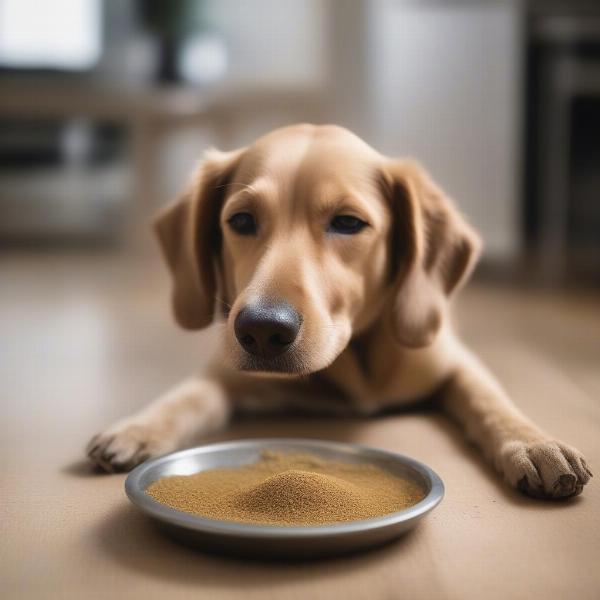Cumin, a staple in many kitchens, is known for its warm, earthy flavor. But did you know this spice can also offer potential health benefits for your furry friend? This article dives into the world of cumin for dogs, exploring its potential advantages, highlighting important safety precautions, and guiding you on how to incorporate it responsibly into your dog’s diet. We’ll cover everything from the different forms of cumin to potential side effects, ensuring you’re well-equipped to make informed decisions about your dog’s health.
Understanding the Potential Benefits of Cumin for Dogs
Cumin contains various bioactive compounds, including antioxidants like cymene and thymol, which may contribute to its potential health benefits. These antioxidants can help protect cells from damage caused by free radicals. Some studies suggest cumin may also possess anti-inflammatory properties, which could be beneficial for dogs with conditions like arthritis. Additionally, cumin is a good source of iron, manganese, and dietary fiber, which can support overall health and digestion. However, it’s important to remember that research on cumin’s benefits for dogs is still limited, and more studies are needed to confirm these potential advantages.
Is Cumin Safe for Dogs? Potential Risks and Precautions
While cumin can offer potential benefits, it’s crucial to use it cautiously. Too much cumin can lead to digestive upset, including vomiting and diarrhea. Some dogs might also be allergic to cumin, so it’s essential to start with a small amount and monitor your dog for any adverse reactions. Never give your dog cumin essential oil, as it’s highly concentrated and can be toxic. Always consult your veterinarian before adding any new supplements or spices to your dog’s diet, especially if your dog has pre-existing health conditions or is taking medication.
How to Incorporate Cumin into Your Dog’s Diet
If your veterinarian approves, you can add a small pinch of ground cumin or cumin powder to your dog’s food. Start with a tiny amount, about 1/8 of a teaspoon for small dogs and up to 1/4 teaspoon for larger breeds. Observe your dog closely for any digestive issues or allergic reactions. You can gradually increase the amount if your dog tolerates it well, but always stay within the recommended dosage. Avoid giving your dog cumin seeds whole, as they can be a choking hazard.
 Dog Eating Food with Cumin
Dog Eating Food with Cumin
Different Forms of Cumin: Which is Best for Dogs?
Cumin is available in various forms, including seeds, ground cumin, and cumin oil. For dogs, ground cumin is generally the safest and easiest to incorporate into their food. As mentioned earlier, cumin essential oil should be avoided entirely. Cumin seeds can be a choking hazard, so it’s best to stick with the powdered form.
Cumin for Specific Canine Health Issues: What Does the Science Say?
While anecdotal evidence suggests cumin might help with certain canine health issues, scientific research is still limited. Some pet owners believe cumin can help with digestion, reduce inflammation, and even boost the immune system. However, it’s important to rely on evidence-based information and consult your veterinarian before using cumin to address any specific health concerns.
Conclusion: Cumin for Dogs – A Cautious Approach
Cumin, with its potential antioxidant and anti-inflammatory properties, might offer some health benefits for dogs. However, it’s essential to prioritize safety and consult your veterinarian before incorporating cumin into your dog’s diet. Start with small amounts, monitor your dog closely, and avoid cumin essential oil altogether. By taking a cautious and informed approach, you can explore the potential benefits of cumin while safeguarding your furry friend’s well-being.
FAQ
- Can I give my dog cumin seeds? It’s best to avoid giving your dog cumin seeds whole, as they can be a choking hazard. Opt for ground cumin instead.
- How much cumin can I give my dog? Start with a very small amount, such as 1/8 teaspoon for small dogs and 1/4 teaspoon for larger breeds. Always consult your veterinarian for personalized advice.
- What are the signs of a cumin allergy in dogs? Allergic reactions can manifest as digestive upset (vomiting, diarrhea), skin irritation (itching, redness), or respiratory problems.
- Is cumin essential oil safe for dogs? No, cumin essential oil is highly concentrated and can be toxic to dogs. Never give your dog cumin essential oil.
- Can cumin help with my dog’s arthritis? Some studies suggest cumin may have anti-inflammatory properties, but more research is needed to confirm its effectiveness in treating canine arthritis. Consult your veterinarian before using cumin for this purpose.
- Can cumin improve my dog’s digestion? Cumin is a good source of dietary fiber, which can aid digestion. However, too much cumin can cause digestive upset.
- Where can I buy cumin for my dog? Ground cumin is readily available in most grocery stores.
Related Articles
- black cumin seed oil for dogs
- paste for dogs
- turmeric powder dosage for dogs
- natural remedies for valley fever in dogs
ILM Dog, a leading international pet website, is dedicated to providing expert advice on all aspects of dog care, from breed selection and health to nutrition, training, and grooming. We offer a wealth of valuable resources for both new and experienced dog owners worldwide. Whether you’re seeking guidance on choosing the right breed, understanding your dog’s health needs, or finding the perfect accessories, ILM Dog is your trusted companion on this journey. For expert advice tailored to your unique needs, contact our team at [email protected] or call +44 20-3965-8624. Visit us at ILM Dog for more information.